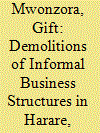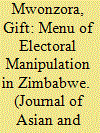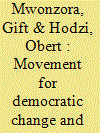|
|
|
Sort Order |
|
|
|
Items / Page
|
|
|
|
|
|
|
| Srl | Item |
| 1 |
ID:
188940


|
|
|
|
|
| Summary/Abstract |
Recent research on the informal sector has devoted considerable attention in examining how informal traders have been affected by the coronavirus in different temporal and spatial settings. However, less well understood is the extent to which central and local governments can cunningly use the veil of COVID-19 pandemic to regulate and re-shape the informal sector. Seeking to remedy this shortcoming in the prevailing accounts and utilising a qualitative research methodology including observations, discourse analysis, critical review of policy pronouncements, by-laws, legislation, video evidence from city officials, government, health authorities, vendors associations, newspapers articles and through a case study analysis of Harare City in Zimbabwe. The article contributes to the academic and policy discussions on how law, disease outbreak, policy and governmentality of African urban spaces intersect.
|
|
|
|
|
|
|
|
|
|
|
|
|
|
|
|
| 2 |
ID:
168251


|
|
|
|
|
| Summary/Abstract |
Scholars have long been interested in investigating why and how ruling parties manipulate elections in Africa and elsewhere. Despite the importance of such a subject, much remains unknown about the role of incumbents in strategically manipulating electoral processes and outcomes in by-elections in particular. Debate rages on as to whether ruling parties rely exclusively on coercive methods or, in addition, make use of non-repressive methods. In seeking to contribute to addressing this matter, we draw upon a case study of two by-elections held in 2017 in rural constituencies in Zimbabwe, namely Bikita West and Mwenezi East. Our research involved evidence gleaned through personal observations, review of grey literature and personal reflections. Our study established that competitive authoritarian regimes as found in Zimbabwe combine both methods when manipulating by-elections. However, we show that there has been a shift away from heavy reliance on organised acts of naked political violence on the part of the ZANU-PF ruling party since the disputed 2008 elections and in the subsequent 2013 and post-2013 by-elections. Thus, there appears to be an inclination towards the use of subtle methods, including patronage, assisted voting, use of traditional leadership and appealing to the rendition of past violence. Nonetheless, even these methods impinge on the credibility of not only by-elections but also national elections in Zimbabwe.
|
|
|
|
|
|
|
|
|
|
|
|
|
|
|
|
| 3 |
ID:
178260


|
|
|
|
|
| Summary/Abstract |
Nelson Chamisa is central to the political terrain of contemporary Zimbabwe. Post the soft coup of November 2017 and the death of Morgan Tsvangirai in early 2018, Chamisa became president of the Movement for Democratic Change party and contested the July 2018 presidential election. The tempo of changes in the Movement for Democratic Change presidency is not related directly to the shift from Mugabe to Mnangagwa. However, broader politics formed an important context for Chamisa’s contested claim for the Movement for Democratic Change presidency. In examining Chamisa and the Movement for Democratic Change, the article highlights linkages between personality politics and electoral mobilization, and how this relates to political party institutionalization.
|
|
|
|
|
|
|
|
|
|
|
|
|
|
|
|
|
|
|
|
|